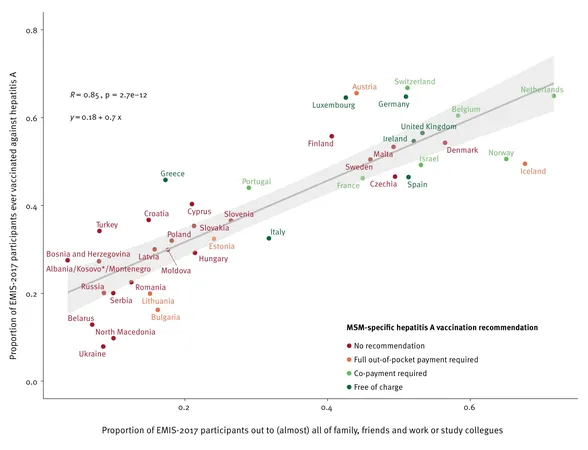
European Men Who Have Sex with Men Face Alarming Hepatitis A and B Risks: What's Being Done?
2024-11-07
Author: Siti
Introduction
A recent investigation of survey data involving over 113,000 men who have sex with men (MSM) in Europe has revealed a worrying trend concerning their vaccination against viral hepatitis A and B. The study, published in the journal Eurosurveillance, shows that although awareness about hepatitis is relatively high among this population, only 44% of respondents have actually received vaccinations for both types of the virus. This creates significant public health concerns, especially given the availability of vaccines and the existing health guidelines recommending their use.
Public Health Concerns
Men who have sex with men are disproportionately affected by viral hepatitis infections. Factors such as societal stigma, discrimination, and the sometimes secretive nature of their sexual activity can hinder access to healthcare services, leaving them vulnerable. Interestingly, sex between men is recognized as the second most prevalent cause of acute hepatitis B infections across Europe. Nonetheless, vaccination recommendations specifically targeting MSM exist in only about three-quarters of European countries (32 out of 42).
Outbreak History
Historically, outbreaks of hepatitis A among MSM have been reported globally, with a notable multi-country outbreak occurring in Europe from 2016 to 2018. Alarmingly, just under half of the European nations (19 out of 43) currently recommend vaccination against hepatitis A for MSM.
Study Overview
This comprehensive study incorporated data from the European MSM Internet Survey 2017 (EMIS-2017) involving 113,884 participants from the WHO European Region. Researchers Brandl and colleagues focused on patterns of vaccination uptake, while another team led by Burdi examined foundational knowledge about hepatitis A and B.
Key Findings on Vaccination Uptake
The analysis revealed that only 48% of respondents had received vaccinations for hepatitis A, and 53% had been vaccinated against hepatitis B. Strikingly, higher vaccination rates were noted among individuals who were more open about their sexual orientation and in countries where vaccines are recommended for MSM. Factors such as age, urban living, financial stability, and a history of hepatitis C or HIV diagnosis positively influenced vaccination rates.
Understanding Hepatitis Health Knowledge
The study conducted by Burdi and team assessed the fundamental understanding of viral hepatitis among participants. While two-thirds of respondents (68%) displayed basic knowledge, variations existed across different demographics. Notably, older participants and those with a history of hepatitis or HIV had better awareness levels. Despite this, among respondents who were not vaccinated or immune, a staggering 58% and 62%, respectively, reported they had never been offered vaccinations for hepatitis A or B.
Call for Action: Targeted Public Health Initiatives Needed
The research underscores the pressing need for tailored public health initiatives to actively promote vaccinations for hepatitis A and B among MSM. Brandl’s team advocates for national vaccination recommendations specific to MSM and proposes making vaccines available at either no cost or a reduced fee. Both studies conclude that enhancing access to information and services for younger MSM, particularly in socioeconomically disadvantaged areas, is critical.
Conclusion
Ultimately, fostering a supportive and accepting environment can significantly improve health outcomes for men who have sex with men. This approach not only encourages openness about sexual health but also facilitates effective public health strategies aimed at reducing the burden of viral hepatitis in this vulnerable population.
What Can You Do?
If you or someone you know identifies as MSM, it's crucial to stay informed about hepatitis risks and vaccination opportunities. Together, let's break the stigma and ensure that everyone has access to the healthcare they deserve.




 Brasil (PT)
Brasil (PT)
 Canada (EN)
Canada (EN)
 Chile (ES)
Chile (ES)
 España (ES)
España (ES)
 France (FR)
France (FR)
 Hong Kong (EN)
Hong Kong (EN)
 Italia (IT)
Italia (IT)
 日本 (JA)
日本 (JA)
 Magyarország (HU)
Magyarország (HU)
 Norge (NO)
Norge (NO)
 Polska (PL)
Polska (PL)
 Schweiz (DE)
Schweiz (DE)
 Singapore (EN)
Singapore (EN)
 Sverige (SV)
Sverige (SV)
 Suomi (FI)
Suomi (FI)
 Türkiye (TR)
Türkiye (TR)